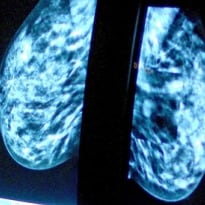Drugmaker Roche says £43,000-a-year treatment can extend lives of women with aggressive form of disease
A new but very expensive breast cancer drug has shown "unprecedented" benefits in extending the lives of women with an aggressive form of the disease.
Data released by the pharmaceutical company Roche suggests Perjeta could, in combination with other drugs, increase the survival of women with advanced breast cancer by 15 months. The results will raise the stakes in the battle in the UK over the funding of cancer drugs.
Perjeta was turned down in principle by the National Institute for Health and Care Excellence (Nice) for routine NHS use last year, but women can obtain it if their doctor applies to the Cancer Drugs Fund, set up by the government to take the political heat out of the question of access to expensive new cancer medicines.
However, the fund, due to be closed in 2016, has been massively overspent and it is generally agreed not to be a long-term solution to the problem of which drugs the NHS will pay for and at what price.
Nice has not given its final opinion, but turned down Perjeta in draft guidance because there was not enough evidence to show how long it would extend life.
Roche will say the study answers that question, but Nice will then be faced with the affordability question. Perjeta costs £2,395 per 420mg vial. Patients need double that dose initially and then one vial every three weeks, which adds up to more than £43,000 a year. It has to be used in combination with Roche's blockbuster Herceptin and also the chemotherapy drug docetaxel, adding to the cost.
Roche claims the new trial data, presented at a conference of the European Society for Medical Oncology in Madrid, shows that the combined treatment can extend the survival of women with advanced HER2+ breast cancer by 15.7 months more than the current standard treatment.
"These results are impressive," said Professor David Miles, a consultant medical oncologist at the Mount Vernon Cancer Centre, who led the study for Roche. "They show a magnitude of survival benefit which we have never seen before in advanced breast cancer, let alone this particular type, previously regarded as having a poor prognosis and being difficult to treat."
Patient groups, which used to blame Nice when it failed to approve drugs for the NHS, are now starting to criticise the companies. One of them, Breakthrough Breast Cancer, has launched a campaign for them to lower their prices.
"Breast cancer patients and their families are paying the price for the failures of the pharmaceutical industry and of government to find a long-term solution," it says in its campaign material. "It's impossible to put a price on life's precious moments. But it's not impossible to put a fair price on drugs which could stop more of these moments being missed."
Dr Sarah Rawlings, of Breakthrough, said the Perjeta results were very impressive and that the organisation had been disappointed with Nice's decision last year, but made it clear that price was a big issue. "Whilst women in England can currently get access to Perjeta through the Cancer Drugs Fund, unfortunately there is no such allowance for the rest of the UK, meaning highly effective but incredibly expensive drugs are not routinely available to those that need them," she said.
The fund, set up with a budget of £200m a year, has overspent by £150m this year. Last month the health secretary, Jeremy Hunt, said it would get an extra £80m a year, but at current spending levels it will remain in the red. Much of its budget goes on drugs made by Roche, whose most recent breast cancer drug, Kadcyla, costs £90,000 per patient - far higher than the Nice maximum of £50,000 for a cancer drug at the end of life.
Separately, a charity has said more than 700,000 women in the UK are living with a hidden risk of breast cancer. Breast Cancer Campaign said women deemed to have high breast density were at a significantly higher risk of developing the disease than others. High density means there is more collagen and glandular tissue, rather than fatty tissue, in a woman's breasts.
A clinical trial recently found that 8.3% of women aged 47 to 75 are deemed to have a high breast density. The charity said that based on population estimates, 721,187 women fell into this category. Research has also shown that women with the highest density are up to five times more likely to develop breast cancer than women with low density.
Delyth Morgan, chief executive at Breast Cancer Campaign, said: "The best weapon in overcoming breast cancer is the ability to stop the disease occurring in the first place. To do this, we need better ways to identify who is most at risk. The emerging evidence on risk factors such as breast density, which we now know is putting hundreds of thousands of women at risk of developing breast cancer, must be taken into consideration and more must be done."
The charity has commissioned research exploring whether monitoring a woman's breast density could help determine whether she would benefit from risk-reducing treatment such as preventive drugs. It also hopes there will be a pilot scheme to look into whether or not incorporating information about breast density should be included in the NHS breast screening programme.
A mammogram display on a screen. Photograph: Rui Vieira/PA














